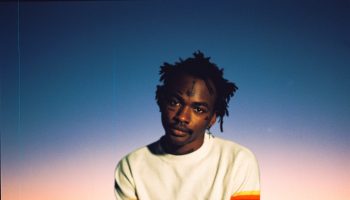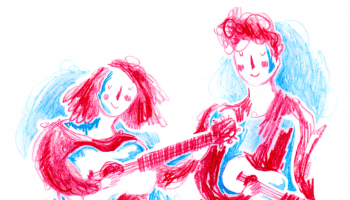San Cisco have long felt like a contradiction. On their self-titled 2012 debut, they were fresh out of high school but were already proficient at steadily balanced raw emotion with bubbly humour. They followed that up with Gracetown, a melancholy-drenched record of breakup songs written to the rhythm of toe-tapping guitar riffs.
Settling in on The Water, their just-released third album, that contradiction seems to have resolved itself through the process of organic maturation. Submitting their most compact project yet (10 tracks), The Water has the clearest direction we’ve seen from San Cisco. Frontman Jordi Davieson continues to brood over fractured, crumbling relationships but now, the music stands as a mirror to the sunny sadness of the lyrics rather than a jarring juxtaposition.
Without losing their signature danceable spark, San Cisco have channelled influences across three four decades of pop to find the nuance, maturity and personality that elevates The Water up as their best project yet.
They’re now gearing up to take it on the road on a national tour, before an August trip to their adoring fans in North America.
As they tour Australia, San Cisco will play two special shows in Mulgrave and Chelsea Heights as a part of TAC’s Urban Spread, a series of shows dedicated to bringing the music back to the suburbs.
Speaking on the phone to Lot’s Wife a week after The Water’s release, San Cisco’s songwriting, guitar-playing maestro Josh Biondillo talks the recording process, getting his mum’s approval and how he writes so many bloody good melodies.
Hey Josh, thanks for making the time to chat. How’s the day been?
Good, I’ve just been easing into the day. We’ve just come off the back of a month of rehearsals so this is our first day off – kind of, not really. We’re doing promo today.
There’s never really a day off, is there?
No, there’s not…
How’s the live show coming along, is it shaping up well?
It’s good, yeah. I think we’ve levelled it up this time around, it’s starting to take shape which is good.
You’re heading down our way soon for Urban Spread, where you’ll be playing some shows out in the suburbs. Does this feel like a bit of a return to your roots after touring the world?
I guess so, it’s part of the Australian tour so it’s just another show on the tour. It’ll be a good one.
Do you notice anything different when you play the smaller-sized venues or is it all the same good time?
I think it’s a good thing to do, it’s definitely good to play smaller, more intimate shows which I like actually, I think it’s good. It’s kind of a better connection to the crowd.
Does it change anything in the way you play or plan out the set?
It’ll probably be the same set, but I think the crowd and the venue make for a different kind of experience for all of us.
What are your earliest gig memories?
To be honest with you, I didn’t really get out very much when I was younger. It’s only been very recently that I’ve been able to get out and watch gigs. When I say very recently, I mean the past five years since I left school.
The early shows that I saw were kind of the big touring acts that were coming out in the big, huge venues like arenas, like your Bob Dylans and stuff like that.
How much of that stays with you now?
I’m still a huge Bob Dylan fan. It has all kind of trickled through to my understanding of how live shows should happen, I guess.
Let’s chat music. You’ve got a hot new album out that everyone’s talking about. What’s the first week after release like?
It’s been good! I think people seem to like it, it has been well-received but I don’t know. We’ve not really spoken to our manager about it just yet because, like I said, we’ve been making the live show so we haven’t really had time to get the word on it.
But yeah, I think it feels good. I don’t feel like it has hit any walls, really.
Were there many nerves going into release or were you comfortable and happy no matter what happened?
I was definitely nervous, I think [the album] came from a very different place and feels like a very different effort this time around. In some ways, it feels like a very exciting social experiment.
There’s really no way of knowing, it’s not like an engineer who mathematically knows that his product is going to live up what he intends it to. With music it’s a lot to do with personal taste and for me, it’s like – I like it, [vocalist] Jordi likes it, my mum likes it. That’s all you’ve really got to go by.
And mum’s approval is probably the most important, isn’t it?
It definitely is! Always.
I find that comparison to an engineer really interesting. You’ve got an incredible knack for writing melodies and I think it’s one of the first things that jump out to people listening to San Cisco. Is there a bit of a science behind the art, or does it come completely naturally to you?
It’s partly natural, but I feel like we’ve gotten better at writing songs. Obviously, the more you do something the better you get at it, but I feel like my mind for melodies is definitely something that I’ve developed and I feel like I’m getting better at with the more music that I listen to and as my taste evolves, I guess as well it changes the way I approach melody.
When you did Gracetown, Daft Punk came up as an album you were smashing in the studio, which maybe leaked into the record as an influence. What did you listen to this time around?
What was I listening to? I don’t know, I’ve been listening to a lot of old music. I haven’t really found any new music I’ve been digging, I’m on this 1970’s West Coast Americana thing at the moment, like The Eagles and that whole scene.
After the 60’s, these bands had established themselves as artists and had made a fair bit of cash, and they were looking to reinvent themselves.
At the same time, producers were getting a lot more savvy in the studio with pushing things further, pushing production techniques and I’ve been really digging that era of music. Bands like The Eagles, The Doobie Brothers, bands from Los Angeles and bands from the West Coast.
Is this your first deep dive into that sound or are you revisiting after previously going in?
It’s my first deep dive into it, it’s the first time I’ve given it a listen.
Is it important for you to delve into the history of the genre and understand where each era fits?
I guess it’s important because it helps me understand where it comes from, how they went about doing it and why it presents itself the way it does.
You touched before on producers, I’ve read that on Gracetown you weren’t planning on producing with Steve Schram until it just happened. Was Steve your go-to man from the start on this one?
Yeah, he really was. We were – not apprehensive – but we were trying to do it ourselves with Gracetown and then it fell into doing it again with him because we had worked with him in the past.
Because we had such a fruitful experience with Gracetown, we decided to go with him again with The Water and it definitely came from a different place in the sense that, with Gracetown, we had a lot more ammunition going into the studio but with The Water, we did a lot of writing in the studio – it almost entirely came about in the studio.
I did hear that you had a more collaborative approach to song-writing on this record, what did that result in?
Yeah, like I said, because we had less coming into the studio, there were less things that had been done start to finish on my phone or laptop or whatever. Because it was done together in the studio, it was a lot more collaborative like that.
Steve’s apparently the man to reign in the band’s weirdness, but it seems like you’re getting a longer leash on each record. What would it sound like if you were completely left to your own devices?
It probably wouldn’t be too different; we’ve learnt how to do this together. I think, because of our understanding and our approach to making music, it would be pretty similar.
Each of your albums feel like a maturation of an earlier sound, which I think is really rewarding for fans tracking each release. I’ve heard you describe it as a natural, more mature and professional growth – can you detail what those changes look like?
I just think that songwriting-wise, songwriting in its raw state, I think it’s a lot more mature effort … I think melodically it goes to different places than it has before and even production-wise, we just got our hands on new bits of software that have been inspiring for us.
I think that comes through on the album, we can hear a whole bunch of sounds that are just different to anything we’ve heard on a San Cisco album and it’s really cool.
Yeah, I guess it’s a very natural kind of progression.
Gracetown got its name from a small town with some heavy ties to the band. What’s the meaning behind The Water and why did that stick?
The Water was something [drummer] Scarlett really liked and latched onto, kind of how it tied into the aesthetic and the artwork. I guess that’s really where it stemmed from, just the artwork.
The art is by the same artist as Gracetown, isn’t it?
Yeah, a local guy.
Urban Spread has put together some dream combinations. I know your special guests are still under wraps, but I gave you a magic phone and you could get any artist for Urban Spread, who’d you call?
Who would I get? That’s a hard one.
Sorry, I’ve put you on the spot a bit there.
I don’t know, maybe, I reckon the rest of the band would agree with me, maybe André 3000? If we could get him out the retirement home, that’d be sick.
San Cisco and 3 Stacks, that’s a show I wouldn’t mind seeing. Thanks for making the time to chat Josh, and we’ll catch you on the national tour.
My pleasure, thanks.
San Cisco’s The Water available now.
Urban Spread 2017 – San Cisco with special guests
Saturday 10 June – Village Green Hotel, Mulgrave (tickets)
Sunday 11 June – Chelsea Heights Hotel, Chelsea Heights (tickets)


